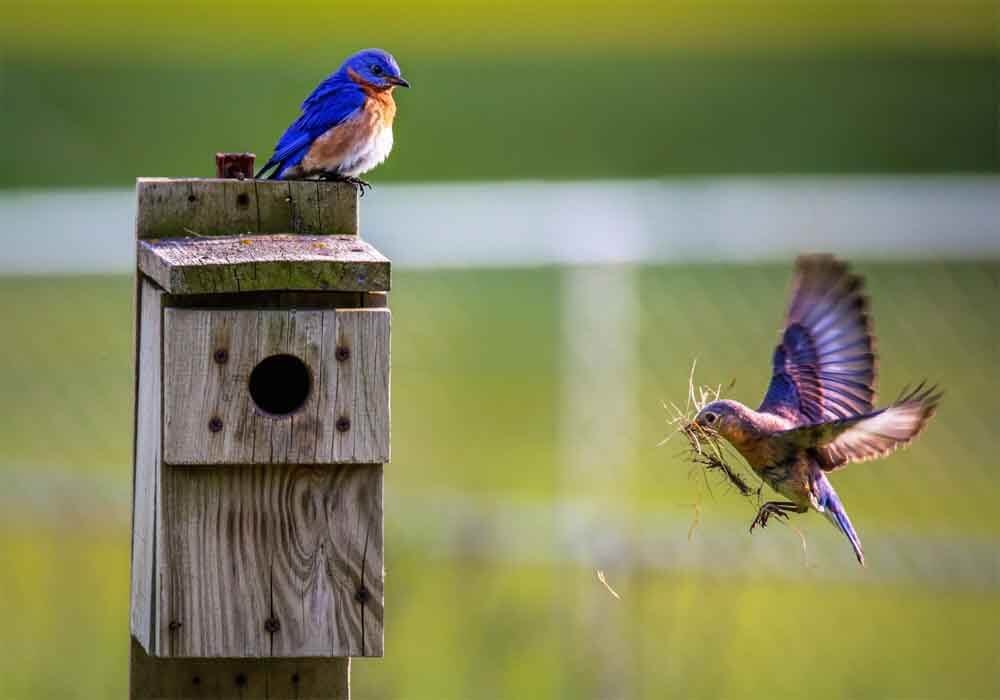Bluebird Nesting Habits
and Behavior
Their signature blue plumage is typically what catches people’s attention, but there is more to bluebirds than just pretty colors. For one, bluebird nesting habits and behavior are quite interesting.
Bluebird nesting habits and behavior include entrusting females with nest construction, which they do by lining pre-existing cavities with pine needles and grasses instead of constructing the cavities themselves. They lay clutches of 2 to 7 eggs with an incubation period of 11 to 19 days.
The rest of the article will further examine bluebird nesting habits and behaviors. You will also find the answer to several related questions at the end of the article, so stick around!

What Month Do Bluebirds Build Nests?
Although we mark the second and third months on our calendars for the start of the nesting season, the temperatures are what actually dictate the bluebirds’ timeline. Thanks to global warming, the seasons don’t follow the calendar as closely as they did in decades gone by, and temperatures in the northern hemisphere can begin rising earlier in the year.
Bluebirds build nests around mid-March, but they begin looking for mates and scouting for cavities to build their nests in as early as February. However, those who find suitable locations earlier than that promptly commence construction of their nests if the conditions are just right.
As global warming continues to change our planet, bluebirds will begin their nesting season preparations earlier in the year. As long as conditions are warm enough, there’ll be no need to wait until March.

Bluebirds love it when you provide them with a place to call home. Yet, they are a bit fussy and prefer some birdhouses over others. Here's a helpful article of ours that highlights birdhouses that Bluebirds love.
Do Bluebirds Stay in the Nest at Night?
Bluebirds don’t stay in the nest at night. They construct nests to lay and incubate eggs and shelter the young that hatch from them. But until such a time, they prefer to sleep in tree cavities and other nooks that provide adequate protection during the night.
The nest as a constant home for birds is a common misconception that takes root in early childhood as kids learn about animals and their habitats. The “birds live in nests” lesson is kept to the basics, so young ones have no trouble understanding.
The problem is that it isn’t always adequately backed up with a broader explanation of nesting seasons when the kids are older and able to understand more.
Thus many adults go through life thinking that birds live in nests all year round.
Do Bluebirds Sleep With Their Babies at Night?
Bluebirds do sleep with their babies at night. Hatchlings and nestlings do not yet have feathers and are unable to keep themselves warm. They rely on their parents to provide warmth when the temperatures drop at night or even during the day in unfavorable weather conditions.
When Is the Bluebird Nesting Season?
The bluebird nesting season begins in February when bluebirds start looking for cavities to build their nests in. At this time, they’ll also be on the lookout for mates. Once they’ve found mates, the female begins nest-building, and eggs are laid 6 to 7 days after the completion of the nest.
The actual nest-building usually takes place from March to April, which is followed by the three nesting cycles in the season:
- The first cycle is from April to May.
- The second cycle is from June to July.
- The third cycle is in August.
Learn even more about nesting Bluebirds
from this YouTube video...
How Long Do Bluebirds Stay in the Nest?
Bluebirds stay in the nest after hatching for a nestling period of 17 to 21 days. When this period comes to an end, they will be fledglings, ready to take their first flight and explore the world outside the nest.
For about three weeks after leaving the nest, they stay in hiding but still rely on their parents to provide food. They give a characteristic call to help their parents track them down and bring them sustenance.
Do Bluebirds Reuse Their Nests?
Bluebirds sometimes reuse their nests. If the temperatures and location is favorable, they’ll return to a previously-made nest as long as it hasn’t been used by other birds during their absence.
Studies have shown that bluebirds exhibit high return and reunion rates. This means that bluebirds reunite with their mates from the previous breeding season and even return to the very same cavity where they constructed their nests the year before.
Why Do Bluebirds Abandon Their Nests?
Bluebirds abandon their nests when a predator has destroyed the eggs while the parents are away from the nest. They may also abandon their nest if the conditions or location is no longer favorable.
When the last fledglings have taken flight, bluebirds have no need for the nest until the following nesting season and will abandon it until then. When February comes around, they’ll most likely return to the very same cavity and build a new nest over the one they previously abandoned.
Why Do Bluebirds Abandon Their Eggs?
Bluebirds may abandon their eggs if they’ve determined that their young would not survive or if there is a threat to their own lives. Additionally, if the weather gets especially cold, they might abandon the nest in favor of a different location.
Here are the reasons for egg abandonment:
- Poor incubation: The eggs may have incubated poorly owing to the female’s constant departure from the nest. Since only the female incubates the eggs, this can lead to poor incubation.
- Egg overheating: Heat waves can cause bluebird eggs to overheat and become unviable.
- Insect infestation: An insect infestation can keep parent bluebirds away.
- Nearby predators: Bluebirds are usually particular about where they build their nests, but when an unforeseen threat arises, they may be forced to abandon their eggs.
- Bad weather: Bad weather affects Bluebirds’ nesting behavior, while harsh weather conditions may force parent bluebirds to seek shelter for themselves if their shelter is not adequate.
- Cold temperatures: Cold temperatures may suppress insect populations which could lead to food scarcity. This may cause bluebirds to venture far from the nest in search of food and cause them to get lost.
- The mother is lost: When the female becomes lost or dies, the male will abandon the eggs because only the females incubate.
However, egg abandonment is not exclusive to bluebirds. Many parent birds of many bird species abandon their eggs when their own survival is under threat by predators, dangerous weather, or a food shortage.
Why Do Bluebirds Abandon Their Babies?
Bluebirds abandon their babies if the female bluebird dies, and since the male doesn’t brood, the babies would be unable to thrive. Freshly-hatched bluebird babies don’t have feathers to help them thermoregulate, but since the male doesn’t brood, he would abandon them.
Bluebirds usually don’t get “parenting” cold feet, but the phenomenon is known to occur. Male and female bluebirds have very specific roles. The female is responsible for nest-building, incubation, and brooding, and the survival of the young is inherently dependent on the female bluebird.

Of course, after the nesting process come the babies! There's lots of interesting things to learn about these cute chicks, and we cover everything in our fascinating article which is all about facts about Bluebird babies.
Bluebird
Nesting Habits and Behavior
...Conclusion
Bluebird nesting habits and behavior are some of the most fascinating of any species in the avian world. They set themselves apart by how they construct their nests and how they see their fledglings through to independence.
But without a doubt, it is their high return and reunion rates that make them a truly remarkable species.
Back To The TOP Of This Bluebird Nesting Habits And
Behavior Page

About the Author...
Richard Worden, a dedicated bird lover for over 20 years, I love to share my in-depth knowledge and passion for birds. Read more About Me and my expertise in this field.
- We Know Birds HOME ›
- Bluebird Facts and Information ›
- Bluebird Nesting Habits and Behavior
